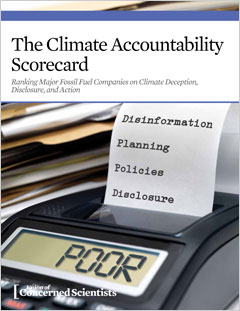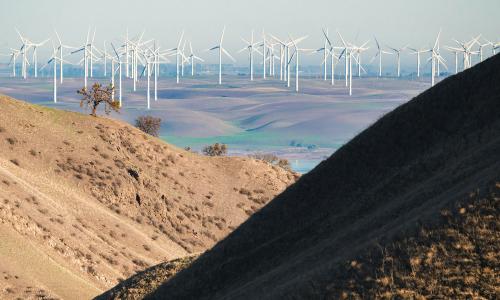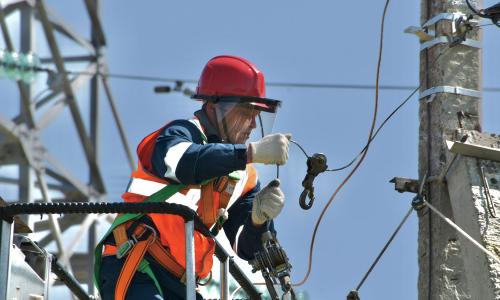View the latest update: The Climate Accountability Scorecard 2018 >
Major fossil fuel producers bear a particular responsibility for climate change.
Their products cause a buildup of heat-trapping gases in the atmosphere.
Many of these companies have worked to systematically block laws or regulations that would reduce heat-trapping emissions, in some cases by spreading disinformation about climate science.
And they are continuing to encourage, plan for, and invest in expanded and unabated fossil fuel use—despite fully understanding the adverse climate impacts of their products.
It's time for fossil fuel companies to be held accountable for their climate actions.
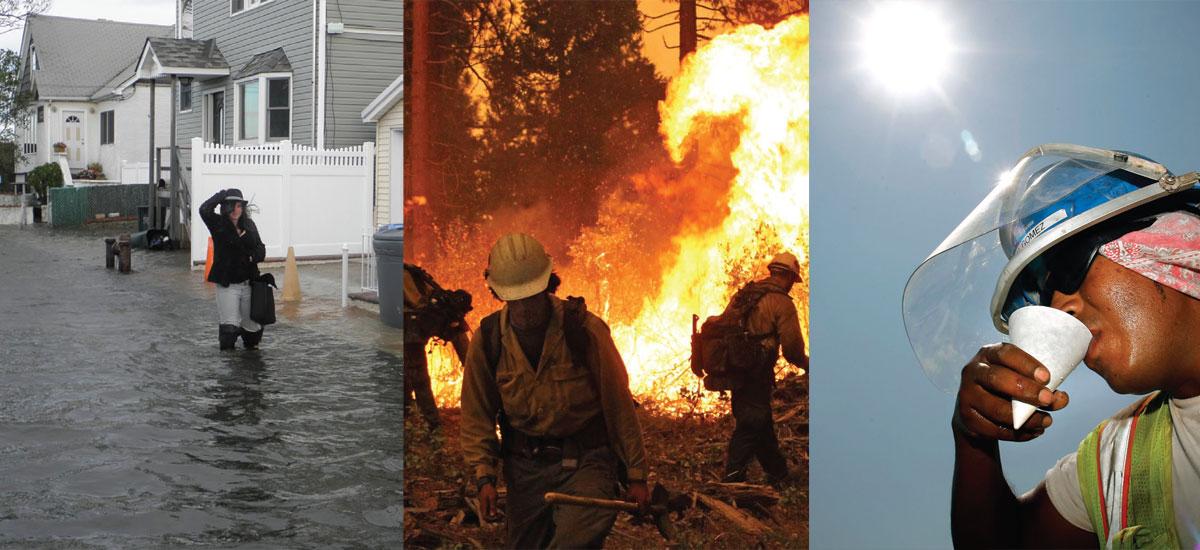
In-depth analysis
This comprehensive study includes eight leading fossil fuel companies and is based on extensive research into the companies' climate-related communications, positions, and actions, focusing on the period from January 2015 through May 2016.
Company Profiles and Scorecard Results
Results for ArchCoal and Peabody Energy can be found in the full report.
The analysis provides a detailed look at four main areas where these companies must take immediate action to prevent the worst effects of global climate change. Each of these areas includes multiple metrics that contribute to a company's overall score for that area; the full analysis features a total of 30 metrics.
The scorecard is intended to help accelerate the transition to a low-carbon future by equipping the media, investors, policy makers, and consumers—you!—with tools to assess companies' current performance and urge specific, immediate action.
The methodology and supporting appendices for the analysis are available below.
Failing to renounce disinformation on climate science and policy

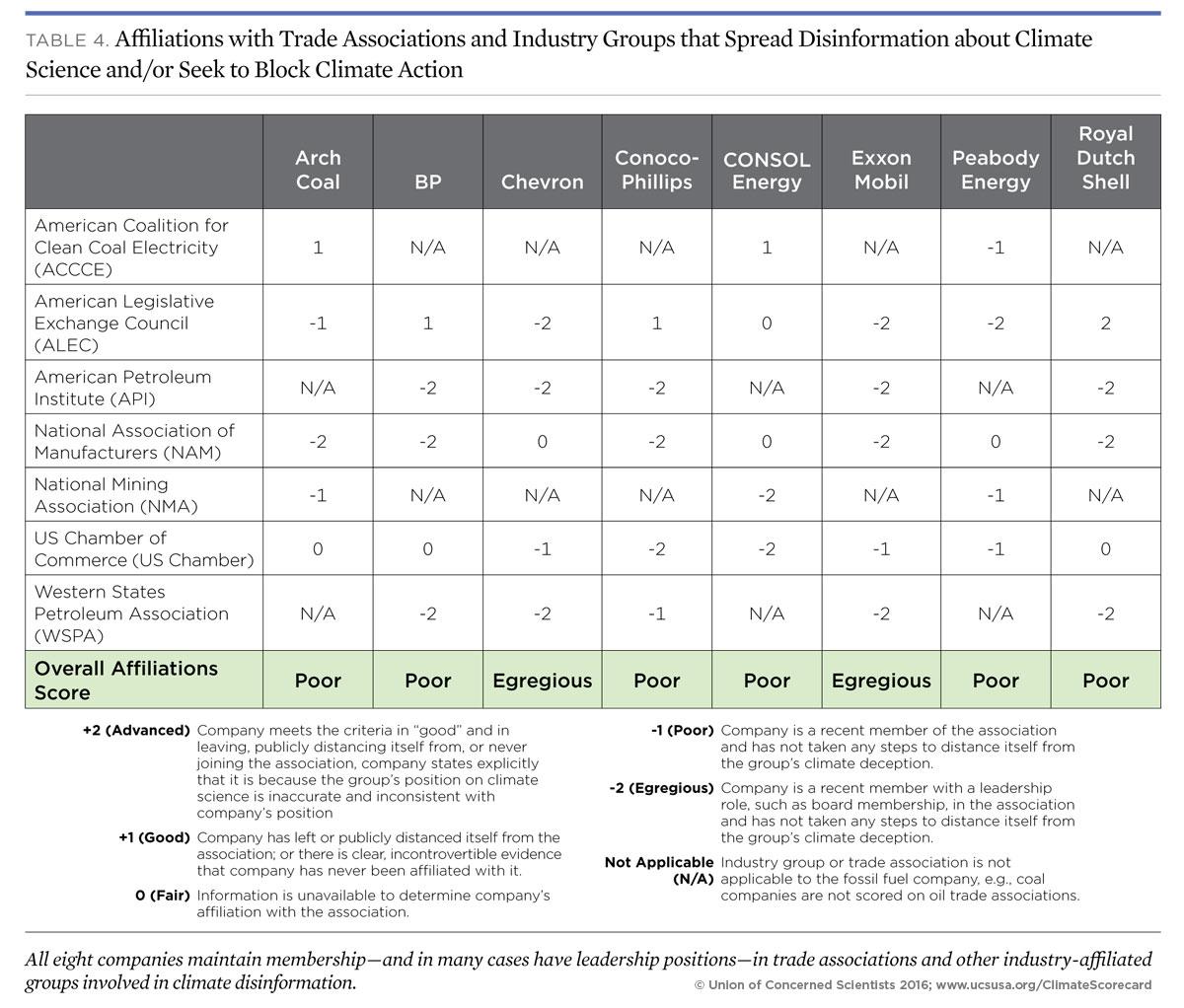
All eight companies maintain membership—and in many cases have leadership positions—in trade associations and other industry groups that spread disinformation about climate science and/or seek to block climate action.
All companies except BP and Shell scored low on the metric for “accuracy and consistency of public statements on climate science and the consequent need for swift and deep reductions in emissions from the burning of fossil fuels.”
Failing to plan for the world's commitments to fight climate change

Among the companies in our study, only BP and Shell have publicly expressed support for the international climate agreement reached in Paris in 2015 and its global temperature goals.
None of the eight companies has laid out a company-wide pathway or plan to align its business model with the Paris Climate Agreement. (View the scorecard results for this specific metric.)

A small bright spot: 2 out of 8 companies supportive of fair and effective climate policies

BP and ConocoPhillips received a score of “good” in this area, primarily due to the companies’ disclosure, policies, and oversight related to political spending. All companies should do more to publicly support and advocate for climate policies.
During the study period some of the companies made general statements about the need to reduce emissions of heat-trapping gases but fell short of expressing support for specific US policies, such as the Environmental Protection Agency’s (EPA) Clean Power Plan or the EPA methane rule.
Poor to barely adequate disclosure of climate risks to investors

Only ConocoPhillips and ExxonMobil have acknowledged climate change as a contributor to the physical risks faced by their businesses.
All of the companies studied can and should do better to fulfill existing climate risk disclosure requirements, and they should begin to prepare for enhanced disclosure regimes in the future.

What we should expect from fossil fuel companies
The Union of Concerned Scientists has developed a set of standards for fossil fuel producers that choose to chart a new course and act responsibly on climate change.
To meet these standards and retain the public trust and social legitimacy necessary to do business, a fossil fuel producer must accept its role in contributing to the problem and must contribute to solutions, by taking action in five broad areas:
- Renounce disinformation. Stop all corporate support for disinformation on climate science and policy, including affiliation with or funding of organizations involved in spreading disinformation.
- Plan for a world free from carbon pollution. Align the company’s business model with a carbon-constrained world consistent with the goal of keeping warming well below a 2°C increase above pre-industrial levels, as agreed by world leaders.
- Support fair and effective climate policies. Consistently and actively advocate fair and effective policies to reduce heat-trapping emissions at the subnational, national, and international levels.
- Fully disclose climate risks. Fully disclose financial and physical risks of climate change to the company’s business, including its infrastructure and reserve assets.
- Pay their share of climate costs. Agree to pay the company’s share of the costs of climate-related damages and climate change adaptation. This report does not assess company performance in this area, as no fossil fuel company has even begun to pay its share of the costs of climate damages and adaptation.
Methodology and appendices
This analysis covers 30 metrics grouped into four broad categories, each of which has a separate supporting appendix.
For more information on the methodology, data, and sources used for each category and metric, please see the following:
